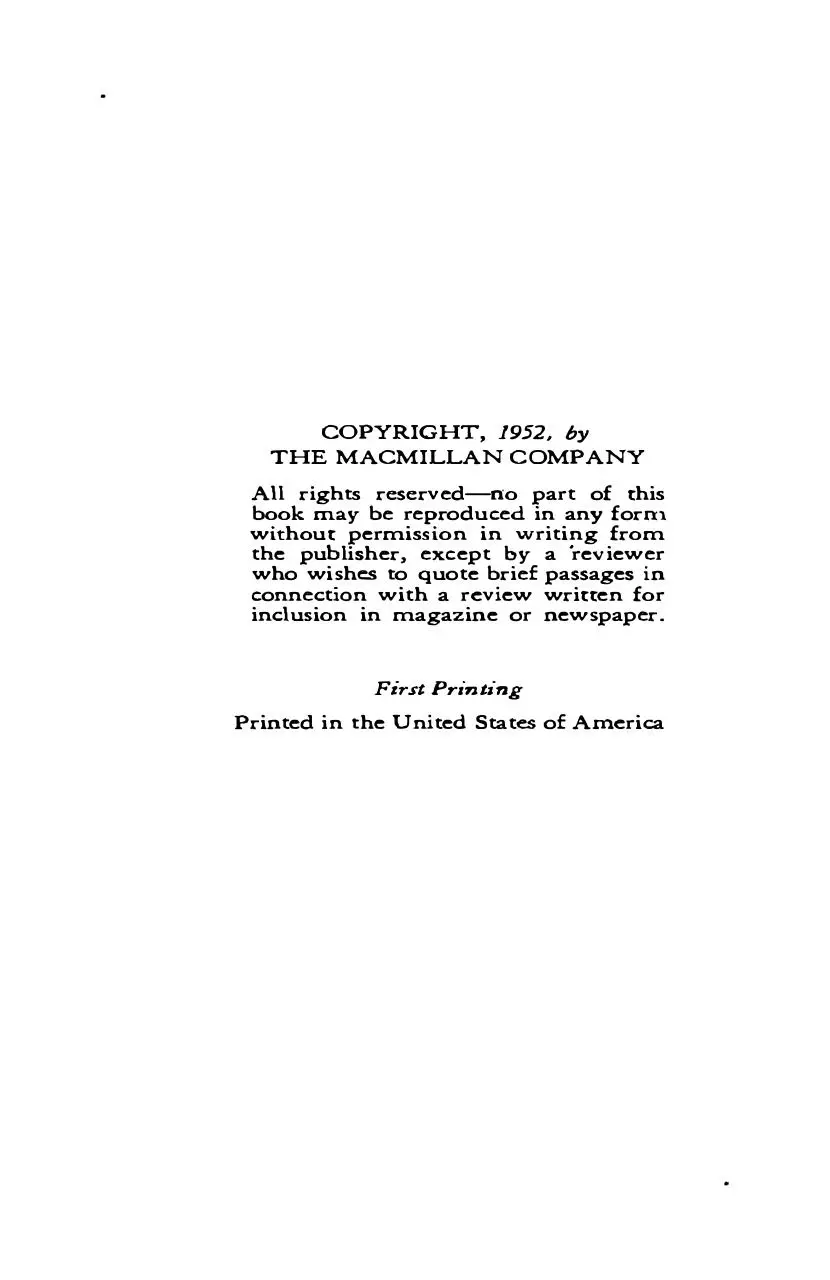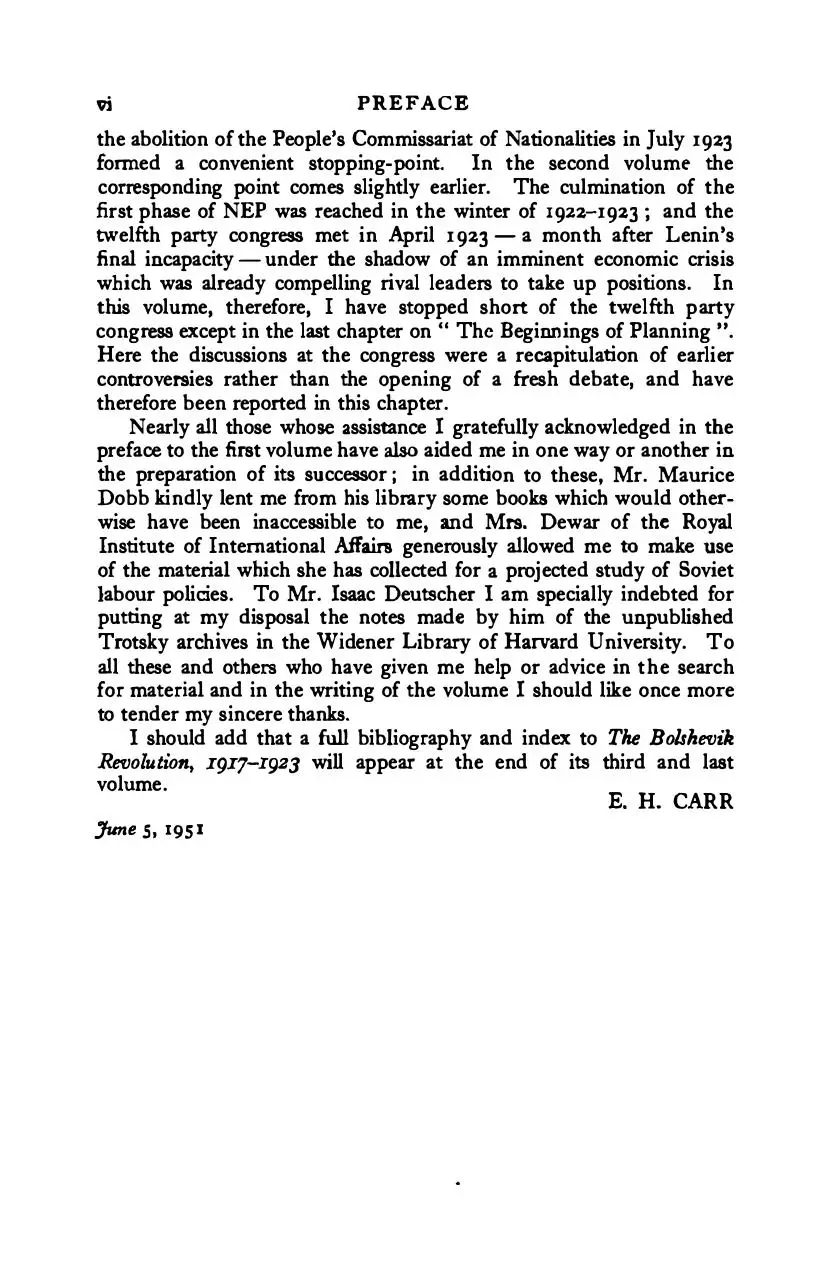Edward Hallett Carr The Bolshevik Revolution, Volume 2 (PDF)
File information
This PDF 1.7 document has been generated by / Adobe Acrobat 9.0 Paper Capture Plug-in with ClearScan, and has been sent on pdf-archive.com on 11/07/2016 at 15:37, from IP address 109.128.x.x.
The current document download page has been viewed 1798 times.
File size: 14 MB (406 pages).
Privacy: public file





File preview
THE BOLSHEVIK
REVOLUTION
THE BOLSHEVIK
1917-1923
1917-1923
BY
BY
EDWARD HALLETT CARR
EDWARD HALLETT CaRR
*
VOLUME TWO
VOLUME TWO
New York
York
THE MACMILLAN
COMPANY
MACMILLAN COMPANY
1952
1952
COPYRIGHT, 1952,
7952, by
by
COPYRIGHT,
THE MACMILLAN COMPANY
THE MACMILLAN COMPANY
All
part of
of this
reserved MO part
this
All rights
rights reserved-no
book
be reproduced
book Illay be
in any
form
reproduced in
any forIll
without
permission
in
writing
from
without permission in writing from
the
the publisher,
reviewer
publisher, except
except by
by aa 'reviewer
who wishes
wishes to
to quote
brief passages
in
quote brief
passages in
connection
with a
connection with
review written
a review
written for
for
inclusion
magazine or
or newspaper,
inclusion in
in magazine
newspaper.
may
who
First
Pirst Printing
Printing
Printed in
in the
Printed
of America
the United
United States
States of
America
PREFACE
work,
OF
the criticisms
criticisms made
by reviewers
the first
volume of
of this
this work,
made by
reviewers of
of the
OF the
first volume
the
most cogent
was the
the charge
that I
had inverted
inverted the
the natural
natural order
order
the most
I had
cogent was
charge that
political and
the first
by describing
the political
of the
first
and constitutional
constitutional arrangements
describing the
by
arrangements of
years
the Soviet
the economic
Soviet regime
of the
in advan�
advance of
of the
economic
of my
treatment of
regime in
years of
my treatment
conditions
which in
in large
large part
part dictated
dictated and
them. The
The
and explained
conditions which
explained them.
appearance
second volume
volume a
a year
after the
now permit
the second
of the
the first
will now
first will
year after
permit
appearance of
of
the two
two interconnected
side by
by side;
and
interconnected subjects
side ; and
of the
examined side
subjects being
being examined
II am
wholly convinced
since the
the awkward
was imposed
imposed
not wholly
awkward choice
am not
convinced that,
choice was
that, since
on
by embarking
the complex
complex
have made
should have
made things
on the
easier by
on me,
me, II should
things easier
embarking on
economic
the period
period without
without first
setting the
the political
political
of the
first setting
economic developmel).ts
developments of
framework
in which
which they
they tOok
place. Even
now the
the picture
picture is
took place.
is not
Even now
not
framework in
complete,
the foreign
of Soviet
ia in
years
since the
relations of
in these
these years
Soviet Russ
Russia
foreign relations
complete, since
are
which should
be ready
ready for
publication
a third
third volume
reserved for
for a
volume which
should be
for publication
are reserved
next
year.
next year.
gement also
volume awkward
problems of
Within
the present
awkward problems
of arran
Within the
also
present volume
arrangement
themselves.
While
every
part
of
an
economy
is
dependent
While
of
themselves.
an
is
presented
every
part
economy
dependent
presented
it was
was obviously
necessary here
here to
to divide
divide the
the Soviet
Soviet
on
on every
other, it
every other,
obviously necessary
into its
main sectors.
sectors. What
What was
clear was
was the
the necess
ity
economy
its main
was less
less clear
economy into
necessity
main period
of
by periods
periods within
within the
the main
period covered
by
division by
a further
further division
covered by
of a
the
volume. At
preferable to
to discuss
first sight
it might have
At first
seemed preferable
the volume.
discuss
might have seemed
sight it
through the
the whole
whole period
period in
in a
the
the development
a
of, say,
say, agriculture
agriculture through
development of,
single
chapter. Since,
the period
period included
three sub-periods
included three
Since, however,
however, the
sub-periods
single chapter.
of the
the period
period of
the revolution
different characteristics
characteristics - the
with markedly
revolution
with
markedly different
and the
of war
war communism
the first
first stage
period of
communism and
of NEP - I
itself,
the period
I
itself, the
stage of
into chapters
on aa chronological
division into
finall
y decided
with each
decided on
each
chronological division
chapters with
finally
sector
the three
three chapters
in tum
turn in
in each
discussed in
of the
the economy
each of
of the
sector of
economy discussed
chapters
to these
these periods.
makes it
for the
the
table of
The table
of contents
it easy
devoted
contents makes
devoted to
periods. The
easy for
reader,
he so
prefers, to
to adopt
the alternative
alternative course
pursuing the
of pursuing
course of
if he
so prefers,
the
reader, if
adopt the
story
agriculture throughout
throughout the
the volume
volume without
without turning
aside
of, say,
turning aside
say, agriculture
story of,
etc.
sections on
on industry,
to intervening
industry, finance,
finance, etc.
to
intervening sections
a word
problem on
which a
word of
explanation may
be required
required
on which
of explanation
A further
further problem
may be
an end.
The general
was the
the point
point at
which to
to bring
bring the
the volume
volume to
to an
end. The
general
at which
was
three-volume instalment
the history
to
instalment of
of the
design
first three-volume
was to
of this
this first
history was
design of
was withdrawn
carry
up to
time when
when Lenin
withdrawn from
to the
the time
Lenin was
from
it approximately
carry it
approximately up
In the
the scene
the struggle
for the
the succession
In
the first
succession began.
first
the
and the
scene and
began.
struggle for
volume
the creation
the adoption
of its
constitution and
of the
its constitution
and
creation of
the USSR,
volume the
USSR, the
adoption of
v
PREFACE
vi
vi
the abolition
abolition of
of the
the People's
People's Commissariat
Commissariat of
of Nationalities
Nationalities in
in July
July 1923
1923
the
fonned a
a convenient
convenient stopping-point.
stopping-point.
In the
the second
second volume
volume the
the
In
formed
corresponding point comes slightly earlier. The culmination of
of the
the
corresponding point comes slightly earlier. The culmination
first
of NEP was reached in the winter of 1922-1923; and the
first phase
phase of NEP was reached in the winter of 1922-1923 ; and the
twelfth
party congress
congress met
met in
in April
April 1923
month after
after Lenin's
Lenin's
twelfth party
1923 - aa month
final incapacity
incapacity - under
under the
the shadow
shadow of
of an
an imminent
imminent economic
economic crisis
crisis
final
which was
was already
already compelling
compelling rival
rival leaders
leaders to
to take
take up
up positions.
positions. In
In
which
this volume,
volume, therefore,
therefore, II have
have stopped
stopped short
of the
the twelfth
twelfth party
party
short of
this
congress except
except in
in the
the last
last chapter
chapter on
on "
" The
Thc Beginnings
Beginnings of
of Planning
Planning".
".
congress
Here the
the discussions
discussions at
at the
the congress
congress were
were a
a recapitulation
recapitulation of
of earlier
earlier
Here
controversies
rather than
than the
the opening
of a
a fresh
fresh debate,
and have
have
controversies rather
debate, and
opening of
therefore been
reported in
in this
this chapter.
chapter.
been reported
therefore
Nearly all
all those
those whose
whose assistance
assistance I
gratefully acknowledged
acknowledged in
in the
the
I gratefully
Nearly
preface
to the first volume have also aided me in one way or another in
preface to the first volume have also aided me in one way or another in
the preparation
preparation of
of its
its successor
success or; in
to these,
Mr. Maurice
Maurice
in addition
addition to
the
these, Mr.
Dobb
lent me
from his
his library
some books
books which
which would
would otherother
me from
Dobb kindly
kindly lent
library some
wise have
to me,
me, and
of the
the Royal
Royal
Dewar of
and Mrs.
have been
been inaccessible
inaccessible to
Mrs. Dewar
wise
;
Institute of
of International
Affairs generously
generously allowed
allowed me
make use
to make
me to
International Affairs
use
Institute
of
the material
which she
for a
projected study
study of
of Soviet
Soviet
a projected
material which
she has
has collected
collected for
of the
labour
policies. To
Isaac Deutscher
for
To Mr.
Deutscher I
I am
am specially
indebted for
Mr. Isaac
labour policies.
specially indebted
putting
at my
the notes
notes made
by him
of the
the unpublished
made by
him of
my disposal
disposal the
putting at
unpublished
Trotsky
archives in
of Harvard
in the
the Widener
Widener Library
Harvard University.
To
Trotsky archives
Library of
University. To
and others
all
these and
who have
or advice
search
others who
have given
me help
advice in
in the
all these
the search
help or
given me
for
the volume
volume II should
like once
once more
and in
of the
material and
in the
the writing
should like
for material
more
writing of
to
tender my
sincere thanks.
thanks.
to tender
my sincere
I should
and index
I
bibliography and
to The
add that
that a
a full
full bibliography
index to
should add
The Bolshevik
Bolshevik
Revolution,
third and
at the
end of
of its
its third
the end
will appear
and last
last
Revolution, I9I7-I9z3
igij-1923 will
appear at
volume.
V0lume
E. H.
H. CARR
E.
'
June
5, 11951
951
Junes,
CONTENTS
PART
IV
PART IV
THE ECONOMIC ORDER
THE ECONOMIC ORDER
Chapter
Chapter
IS.
15.
THEORIES
AND PROGRAMMFS
THEORIES AND
PROGRAMMES
16.
1 6.
THE
THE REvOLUTION
THE IMPACT
IMPACT OF
OF THE
REVOLUTION
(a)
(a)
(b)
(b)
((c)
c)
PAG'R
PACK
3
3
28
28
Agriculture
Agriculture
Industry
Industry
Labour
the Trade
and the
Labour and
Trade Unions
Unions
(d)
and Distribution
Trade and
Distribution
(d) Trade
(e)
(e)
17·
17.
Finance
Finance
WAR
WAR COMMUNISM
COMMUNISM
(a)
(a)
(b)
(b)
(c)
(c)
1
47
147
Agriculture
Agriculture
Industry
Industry
Labour
and the
the Trade
Unions
Labour and
Trade Unions
(d)
Trade and
and Distribution
Distribution
(d) Trade
(e)
(e)
Finance
Finance
1 8.
18.
FROM
FROM WAR COMMUNISM
COMMUNISM TO
TO NEP
NEP
269
269
19·
19.
NEP THE
NEP:
THE FIRST
FIRST STEPS
STEPS
280
280
:
(a)
(a)
(b)
(b)
((c)
c)
Agriculture
Agriculture
Industry
Industry
Labour and
Labour
the Trade
Unions
and the
Trade Unions
(d)
Trade and
and Distribution
Distribution
(d) Trade
((e)
e)
Finance
Finance
BEGINNINGS
20. THE BEGINNINGS
20.
OF
OF PLANNING
PLANNING
Note C.
C. MARX,
ENGELS AND
AND THE
THE PEASANT
PEASANT
Note
MARX, ENGELS
D. WORKERS*
WORKERS' CONTROL
CONTROL ON
ON THE
THE RAILWAYS
RAILWAYS
D.
360
360
385
385
394
394
LIST OF
OF ABBREVIATIONS
ABBREVIATIONS
LIST
399
399
TABLE OF
OF APPROXIMATE
APPROXIMATE EQUIVALENTS
EQUIVALENTS
TABLE
vii
400
400
PARTIV
IV
PART
ORDER
THE ECONOMIC
ECONOMIC ORDER
CHAPTBR
CHAPTER IS
15
HE
T
THE
THEORIES AND PROGRAMMES
" utopian
teaching
from the
the"
of Marx
Marx arose
arose by
reaction from
teaching of
by reaction
utopian"
ism
the early
socialists,
who
constructed
ideal
socialist
of the
ism " of
ideal
who
constructed
socialist
early socialists,
societies
wealth and
ingenuity of
their own
out of
of the
societies out
the wealth
and ingenuity
of their
own
imagination,
feel it
it necessary
necessary to
to concern
concern themselves
themselves
and did
did not
not feel
imagination, and
with the
these ideal
ideal societies
the future
were to
to
the question
how these
societies of
of the
future were
with
question how
Marx's
method was
was
be
the existing
evolved out
out of
of the
societies.
be evolved
Marx's method
existing societies.
historical:
all
man
all changes
the destinies
in the
destinies and
and organization
of manhistorical
changes in
organization of
kind were
were part
the
of an
an ever-flowing
He made
kind
historical process.
made the
part of
ever-flowing historical
process. He
:
assumption
the only
which he
he did
not attempt
to
did not
assumption - the
only postulate
postulate which
attempt to
demonstrate
would in
that modern
modern society
in the
run always
demonstrate - that
the long
society would
always
long run
a way
seek
to organize
in such
way as
to make
the most
itself in
such a
as to
make the
seek to
most effective
effective
organize itself
use of
resources. He
therefore from
an
its productive
He started
of its
started therefore
from an
use
productive resources.
of existing
in order
order to
show that
analysis
to show
that the
the capitalist
existing society
society in
analysis of
capitalist
once instrumental
instrumental in
in releasing
and fostering
order,
releasing and
unprece
an unpreceorder, once
fostering an
dented
the productive
of mankind,
had
of the
dented expansion
resources of
mankind, had
productive resources
expansion of
a stage
course of
now
reached a
in the
the course
historical development
of its
its historical
now reached
stage in
development
where it
hindrance to
to the
the maximum
use of
these
had become
it had
become aa hindrance
maximum use
where
of these
and an
resources
to further
further progress
progress: it
it was
was therefore
therefore
an obstacle
obstacle to
resources and
:
bound,
long as
to yield
yield place
Marx's initial
so long
as Marx's
initial postulate
held good,
bound, so
postulate held
good, to
place
"
"
to
socialism"
or
social order
called either"
either
a new
new social
order (which
Marx called
to a
socialism
or
(which Marx
"
" communism
")
which
would
once
more
permit
and
promote
the
communism ") which would once more permit and promote the
maximum
use of
productive resources.
Marx's conception
conception was
was
of productive
resources.
Marx's
maximum use
political and
the sense
that he
he believed
believed that
that the
the
and revolutionary
in the
sense that
revolutionary in
political
change from
from capitalism
capitalism to
socialism would
would involve
involve the
the replacemen
to socialism
change
replacementt
of
bourgeoisie by
class, and
that it
it
the proletariat
the bourgeoisie
as a
a ruling
of the
and that
by the
proletariat as
ruling class,
at any
was inconceivable,
most countries,
that this
this replace
in most
rate in
was
inconceivable, at
countries, that
any rate
replace-
ment
could be
without revolutionary
violence. But
was
be effected
effected without
ment could
But it
it was
revolutionary violence.
A1>
the economic
of
also
and evolutionary.
also scientific
scientific and
As the
economic structure
structure of
evolutionary.
out of
of the
had grown
capitalist society
society had
the economic
economic structure
structure of
of feudal
feudal
grown out
capitalist
society,
the economic
socialism
so by
similar process
economic structure
structure of
of socialism
society, so
by aa similar
process the
3
Download Edward Hallett Carr - The Bolshevik Revolution, Volume 2
Edward Hallett Carr - The Bolshevik Revolution, Volume 2.pdf (PDF, 14 MB)
Download PDF
Share this file on social networks
Link to this page
Permanent link
Use the permanent link to the download page to share your document on Facebook, Twitter, LinkedIn, or directly with a contact by e-Mail, Messenger, Whatsapp, Line..
Short link
Use the short link to share your document on Twitter or by text message (SMS)
HTML Code
Copy the following HTML code to share your document on a Website or Blog
QR Code to this page

This file has been shared publicly by a user of PDF Archive.
Document ID: 0000399475.